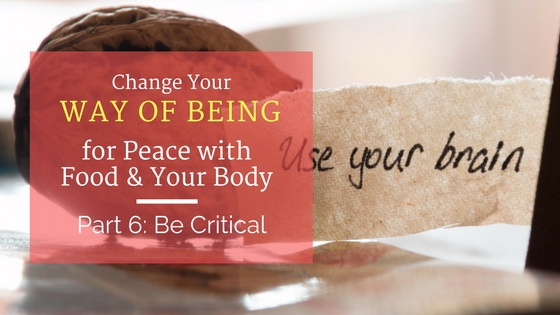
If the title of this article seems surprising, stick with me. Over the last few weeks, you’ve started shifting your way of being and how that relates to eating. So far I’ve suggested you be: grateful, nourished, mindful, self-compassionate, and curious. Within those topics, I’ve definitely encouraged you to be less critical of yourself.
But there’s one thing that needs to be criticized big-time, and that’s our culture. Thinking critically goes a long way towards reducing stress, guilt, and shame when it comes to your relationship with food and your body.
In short: take any of the criticism you think about yourself and turn it on the larger culture instead. Our culture is a total clustercuss for everybody. (That’s one of my favorite phrases from one of my favorite movies, The Fantastic Mr. Fox.) It’s a total clustercuss, except for the beauty and weight loss industries, which prey on your insecurities.
It isn’t only about weight loss, though. Toxic cultural messages encouraging perfection in all areas of our lives make us feel unsatisfied with what we have. Expectations about having the perfect body, perfect face, perfect job, perfect wardrobe, perfect family…
It’s making us perfectly demoralized and anxious. [Tweet “Toxic cultural messages encouraging perfection in all areas of our lives make us feel unsatisfied with what we have.”]
To combat this, here are ways to help you exercise your critical thinking. Ask yourself:
Is it true?
Asking this question helps when, for example, you read something online about the latest, greatest news about weight loss or nutrition. Nutrition research is rarely definitive, and notoriously contradictory. But you’d never know that from how it gets reported. Headlines about the next “superfood” or the new “miracle” discovery are overblown or even baseless.
Asking “is it true?” also helps get down to the nitty-gritty. So much of what’s taken for granted as The Truth is nothing more than current trends. Today’s ideal body – tall, lean, and with toned muscles – may well be considered unattractive in the future.
Is it important?
Just because something is true doesn’t mean it’s significant. Just like “Truth” is a function of the era you live in, so is “Importance.” If you are a mom who also has a job outside the home, no one bats an eye these days. In the 1950s, that would have set neighborhood tongues wagging, because the norm was for mothers to not have outside jobs.
How might this apply to body size? Let’s say someone calls you fat. (I can’t see you, so I’m not sure.) This statement may or may not be true. Maybe you aren’t factually fat, and that other person is imposing their own limited view of what constitutes an acceptable body. Or it could be true. Maybe you are fat. But how is that important? To a very large extent, the hysteria over fat as a health issue is overblown. There’s little evidence to support that paradigm, although a $60-billion/year industry is built on weight loss.
When it comes to companies trying to part you from your money, there is no end to the “important problems” you have. Seriously, someone even came up with the idea that you should steam clean your vagina. ‘Nuff said. And no, it’s not enough to have been done for centuries in Korea. It’s not enough that someone somewhere has done it forever. People used to think mental illness was caused by demons, after all.
Who benefits from this worldview, and how?
Whenever you read an article, book, or blog post – or even just hear someone talking about their latest and greatest diet – ask yourself, “Who stands to profit in some way from this belief/worldview?” One common example is medication research that is sponsored by – you guessed it – a pharmaceutical company. It’s not that this makes the results totally worthless. You just have to put the findings into that larger context.
So if an article recommends a particular way of eating, look to see if the research was paid for by the food industry. Or a supplement manufacturer. Or someone who has built their whole business on a particular diet.
This can hit closer to home, too. Think of your family and friends who are always trying to sell you their weight loss supplements or body wraps. Your friends and family are well-meaning, of course, but they will financially profit from you seeing yourself as flawed. They’re under a lot of pressure to sell, and that pressure spreads to you.
When it comes to friends and family, think beyond financial benefits as well. If someone talks smack about your body or eating, there may be personal gain for them. It might make them feel better, where they feel like they have the upper hand over you. They may feel more virtuous. Alternatively, when a friend or family member tries to get you to go on a weight loss or clean eating plan with them, it also makes them feel better. They may be seeking camaraderie for an otherwise taxing endeavor.







